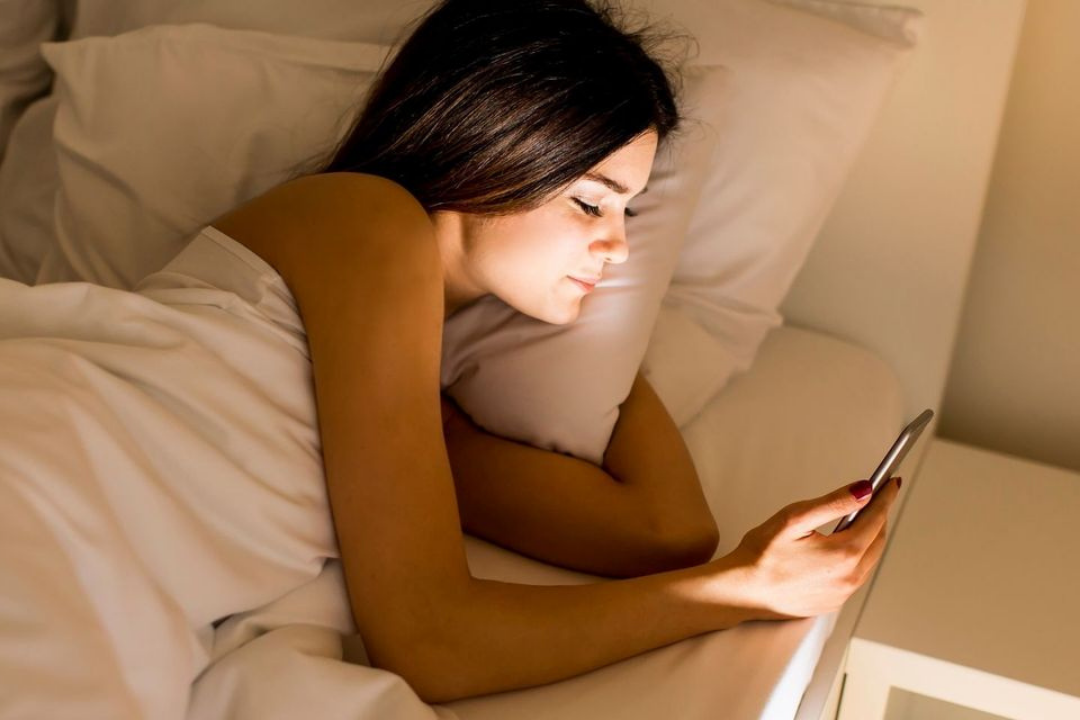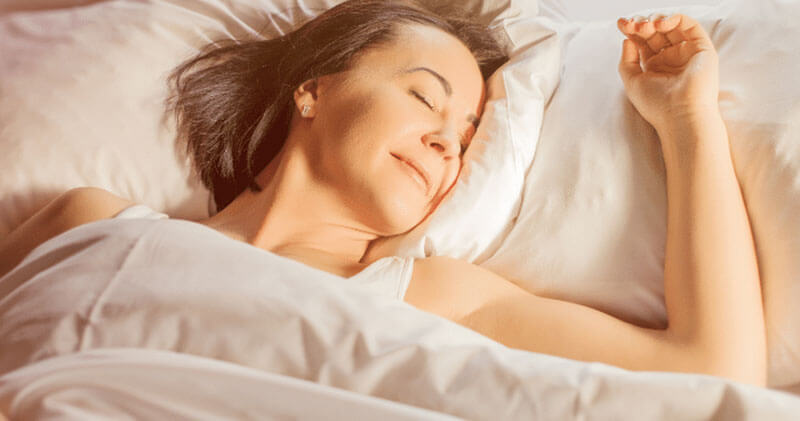At the end of a long day, many of us enjoy settling into bed with our phones or watching TV. In fact, 90 percent of Americans say they look at an electronic device several nights each week shortly before turning in according to WebMD. That’s in addition to the average seven hours of screen time Americans have each day.
Although watching a movie or scrolling through social media may feel like a relaxing way to wind down before sleeping, it’s actually quite the opposite. In fact, it can be counterproductive to getting a good night’s rest.
With so many people using mobile devices before turning in, many are asking the question, do smartphones affect sleep? In short, the answer is yes.
One major reason technology and sleep don’t mix: blue light and sleep don’t mix.
Blue Light Effects on Sleep
Blue light is emitted from smartphones, TV monitors, tablets, and other electronics with a display. That blue light has a negative impact on your sleep, which is potentially harmful to your overall health. So, yes, there is a correlation between technology and sleep. That correlation can lead to sleep deprivation.
Here’s why.
Any sort of light can inhibit your body’s natural production of melatonin. However, Harvard reported that blue light suppresses melatonin more than other types of light.
Melatonin is a hormone that plays an important role in sleep. It helps to regulate your body’s natural sleep-wake cycle (circadian clock) and gets your body ready to sleep.
According to Sleep Centers of Middle Tennessee sleep expert William H. Noah, M.D, “melatonin doesn’t make you sleep, but melatonin helps promote sleep by putting you into a state of quiet wakefulness as levels rise in the evening”.
The pineal gland–located near the center of your brain–produces melatonin, which is released into the bloodstream. Your body’s production of melatonin is affected by the time of day.
Melatonin production increases as it gets dark and decreases when your body is exposed to light during the day. Much like when a bright, sunny sky helps wake you up, too much blue light exposure can keep you awake by inhibiting melatonin production. Ultimately, the exposure to blue light reduces your body’s ability to reach its optimal sleep state.
Accordingly, the more screen time you have–especially at the end of the day–the less melatonin your body is able to create and absorb naturally, and the less drowsy you will be when it’s time to sleep.
If you are less drowsy at bedtime it can delay sleep onset, especially if you are already likely to struggle falling asleep. Anyone who struggles with insomnia, or who has a lifestyle that prevents them from getting the recommended seven to nine hours of sleep at night, knows even a 30 minute delay in sleep onset can contribute significantly to the effects of sleep deprivation.
Dangers of Sleep Deprivation
As we’ve discussed in previous articles, sleep deprivation is directly linked to severe health disorders such as high blood pressure, diabetes, obesity, sexual dysfunction, and an increased risk of stroke. Poor-quality sleep is also linked to Alzheimer’s disease and other cognitive disorders, as well as poor performance at work and an increased likelihood of accidents.
With a connection between blue light and sleep deprivation, it is important to note its sources are not just limited to your electronics.
LED lights, which have found their way into most homes due to their longevity and energy efficiency, emit far more blue light than fluorescent lights and traditional incandescent bulbs (which emit the least). Because the usage of LED lighting is increasing both in your home and outside of your home, it is ever more important to minimize blue light exposure when possible.
If you are interested in learning more about how sleep deprivation caused by technology or other factors affects you, read our recent article: 5 Shocking Ways Sleep Deprivation or Insomnia Affects Your Body
How to Reduce the Effects of Blue Light on Your Sleep
The reality is that smartphones, computers, and TV screens are a significant part of our lives. It would be nearly impossible to eliminate their use altogether and avoid being exposed to blue light. It’s also nearly impossible to escape the illumination of LED lighting or other forms of artificial light sources.
There are, however, some things you can do to mitigate the adverse effects of blue light on your sleep:
- Minimize or eliminate your screen time several hours before bedtime. Ideally, you’ll stop screen time three hours before bed, but if that isn’t possible, try for at least 30 minutes before settling in. Set an alarm to remind yourself, if necessary.
- Take frequent breaks, looking away from your device and focusing elsewhere for at least 20 seconds, three or four times during each hour of use.
- Install and use an app on your device that filters emitted blue light. Although there is some controversy about whether this actually blocks the light, it is worth trying. There are many such apps available at no cost on both the iPhone and Android platforms.
- Turn down the bright light on your phone by dimming the display or switching to night mode or “dark” mode.
- Install a screen protector on your phone that filters blue light. We recommend screen protectors by Ocushield.
- Wear a pair of blue-light-blocking glasses. They’re available for less than 20 dollars or as much as you care to spend for fashionable, designer frames. We personally recommend the line-up of blue light blocking glasses from Swanwick Sleep.
What Color Light Helps You Sleep Better?
We have already discussed the detrimental effects of blue light on your sleep. But is there a light color that helps you sleep better? Yes and no.
According to the Centers for Disease Control and Prevention, red light has no measurable effect on circadian rhythms. So while red light doesn’t actually promote better sleep, it has no properties that interfere with natural sleep patterns, making it the best choice for nighttime light exposure.
Yellow and orange lights do have some effect on melatonin production, but the effects are nominal.
We are sometimes asked, is green light good for sleep? Unfortunately, no. While green light sometimes is used for the treatment of depression and seasonal affective disorder in adults, it does have measurable effects on inhibiting melatonin production.
Accordingly, if you are having trouble getting to sleep at night, or if you just want to optimize your ability to sleep well, you may want to consider using red or amber bulbs for any nightlights or other lights you leave on in close proximity to your sleeping area.
Contact us for More Information
Remember, at the Sleep Centers of Middle Tennessee we want you to sleep well and we are here to help. Please contact our office for more information or to schedule an appointment if you believe you are struggling with a sleep disorder.
10 Best Ways to Optimize Your Sleep
Sleepless nights lead to exhausting days. Discover the best nighttime routine, bedroom environment, and more to help you get to sleep and stay asleep.


